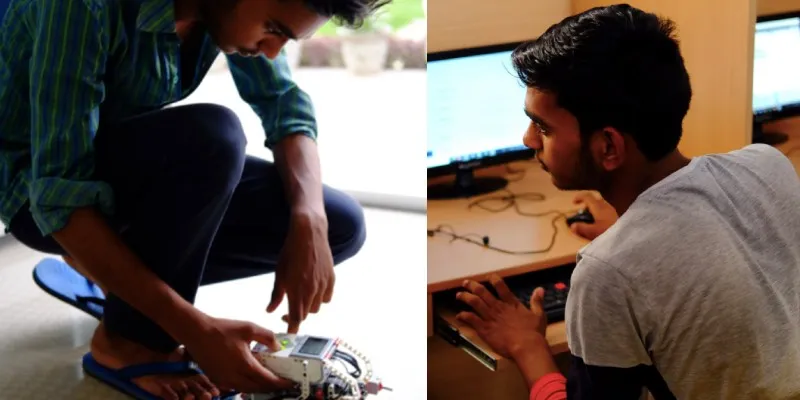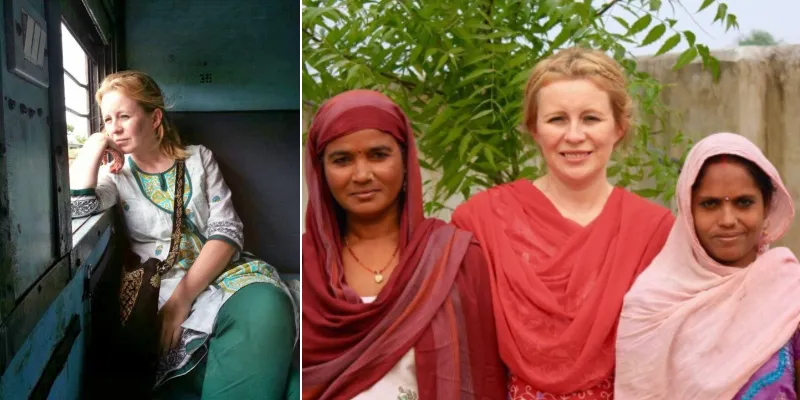This smart village in rural UP is creating social entrepreneurs, bringing robotics to school children
Non-profit United For Hope’s smart village programme is alleviating poverty by addressing basic services gaps and uncovering new markets for sustainable commerce.
1559051792740.png?fm=png&auto=format)
The Smart Village project has impacted the lives of over 25,000 people in the Kushinagar district of eastern Uttar Pradesh
At the young age of 14, Azad balances school, manual agricultural labour in the field, and takes care of his younger siblings in Tirmasahun, a village located in Eastern Uttar Pradesh in Kushinagar District. Though he is in Class 9, with just a year to go before the all-important board exams, his life is much more than just school work.
Azad’s family needs his help as his three younger brothers need to focus on their studies. So he spends time working in the fields before and after school, and also brings produce to the market so that his father can sell it.
Yet, despite his hectic schedule and limited education opportunities, Azad dreams of a career in the field of robotics.
“I love the robotics STEM class! I really like learning to operate systems and I know how to do the programming by myself and that is very exciting,” he quips.

Azad operating one of the robots he programmed during a STEM class.
This is perhaps unusual for someone who is living in Indian villages. But in Tirmasahun, this ambition is gaining ground, and 50 students are today learning computer and soft skills, the English language, and science, technology, engineering, mathematics (STEM), and robotics, at the village’s community centre, run by the non-profit United for Hope.
Tara McCartney, Founder of United for Hope, who started a smart village programme in the village in 2014, says:
“We believe that rural India can become a place of opportunity and prosperity. We believe that holistic social development can be achieved only through collective efforts and effective planning, with economic viability and education as base criteria.”
Today, the village boasts of a higher literacy rate at 69.04 percent, compared to the entire state of UP at 67.68 percent.
1559049813470.jpg?fm=png&auto=format)
The team
This change was in part due to the several in-house and field-based education initiatives run by the organisation, where children not only attend regular classes but they are trained in social skills, informed of varied career opportunities and employment prospects.
Apart from the education initiatives, the smart village project consists of several social enterprises
including rural tourism, harnessing the available natural resources for income generation projects, provision of basic facilities, which includes sanitation, health, and internet access. The project has impacted the lives of entire Kushinagar district and has created livelihood opportunities, reaching over 25,000 people in over 10 communities.
Concept of a smart village
“Generally, when we talk about a smart village, we talk about technology access and digital access. However, I believe that we need a hybrid model focussed on sustainability to create a long-lasting change,” Tara (46) says.
1559050914454.jpg?fm=png&auto=format)
The community centre
Rural development is complex and is interdependent on multiple aspects and stakeholders. For instance, Tara believes that mere construction of toilets is not enough to bring about hygiene and sanitation practices. People need to be educated and made aware of the benefits of using toilets as opposed to defecting in the open. Further the mandate for change needs to be supported by the leaders of the village, and the government needs to be roped in to create a sustainable and scalable change.
The beginning
With this vision of holistic change rooted in sanitation and education, Tara -- a former marketing executive with Microsoft in Germany -- first visited the Kushinagar district with her husband, Vikas Malik, who is an Deputy Advocate General in the High Court of Punjab and Haryana.
“Five years ago, we barely got electricity, for few hours, a day. There was open defecation everywhere, people were drinking dirty water, and there were few good roads and connectivity. And I felt that if I want to radically change my life and dedicate my life to development work, why not start here - in one of the most challenging states in India,” Tara recalls.

Tara McCartney
Hence, Tara began to stay for weeks, and later for months, in Tirmasahun. She interacted with the villagers and the Sarpanch to understand their needs and ambitions. She also spent time with the local bodies and observed the challenges that existed in bringing access to government schemes and policies.
Slowly, she began her first project by partnering with Sulabh Shauchalayas, where she funded 90 percent of the cost, while the village funded the rest. Thereafter, she went door to door explaining the importance of sanitation and the need for toilets. She won the confidence of 25 families and began the construction. And there has been no looking back since!
“Nobody was opposed to the work. Everybody wants development to work and once they are convinced that your motive is right and that you are here to build a sustainable change, they will support you,” Tara says.
1559050539530.jpg?fm=png&auto=format)
With volunteers
Tara invested her savings and formally set up her NGO called United For Hope in 2014 to create economic opportunities and a better future for the villages. She also received funding from organisations like IEEE, and support from other non-profits like Shakti Empowerment Solutions, Fairfactia, and Grow Good Farms.
The centre for change
The heart of the smart village is the community centre.
“We built our first one in our model village of Tirmasahun, Uttar Pradesh. Run on solar power, it serves as the focal point for classes, village meetings, health clinics, drop-in services, internet access, business operations, and much more,” Tara explains.
The centre is equipped with a UV & UF water purification system through which water is sold and delivered to villagers at Rs 5 for 20 litres. It also has an onsite micro-grid that comprises a hybrid system of portable solar battery kits, which provides electric connection for customers, at a nominal cost, within a 250m radius of the installation. Thanks to solar power, they also offer e-rickshaw services to the villagers and town nearby.
1559050067848.jpg?fm=png&auto=format)
At a menstrual hygiene workshop in the village
United For Hope also supplies reusable sanitary pads, which last up to one year. A rarity anywhere else in the district, sustainable and affordable menstrual hygiene products are made accessible here. This enterprise is accompanied by extensive awareness campaigns in schools and colleges.
Further, the incomes of villagers are bolstered through tourism as Kushinagar is a Buddhist pilgrim site. They offer day-trips, and and an onsite guesthouse to tourists where guests have “access to a ‘real’ Indian village” and participate in activities within the local community.
Pillars for sustainable growth
1559050399930.jpg?fm=png&auto=format)
The projects under the Smart Village model are structured under three broad pillars: social enterprise, education, and community support.
- Social Enterprise: They identify basic-needs products and services that can be produced or distributed in the rural community. They then establish a go-to-market plan to ensure enterprises grow into flourishing businesses. These basic-needs enterprises are then cross-subsidised by higher revenue generating activities, such as social tourism. Through these actions, they aim to impact both job creation and attitudes towards entrepreneurship. Some of the social enterprises include a a clean water distribution model, a solar-based basic electricity and transportation business, social tourism and beekeeping.
- Education: The organisation runs education programmes both at the village community centre and in government schools in the district. They provide quality education and vocational training to children, young adults, women, and men. They focus on English and IT skills; in parallel, they offer guidance on entrepreneurship and leadership skills. Special emphasis is laid on gender through menstrual hygiene awareness workshops, gender sensitivity workshops for teenage boys, and vocational training for women.
- Community support: They create projects around citizen’s rights, healthcare, access to digital services, and government welfare schemes. They also work closely with the local government to advocate for better infrastructure, funding and improved facilities. By providing these services, United For Hope aims to influence mindsets, open up new perspectives for citizens and empower them to build a dignified future for themselves.
Way forward
1559050288317.jpg?fm=png&auto=format)
Students operating robots during a STEM class at the Community Centre
A smart village holds the potential to offer a solution to the threats of urbanisation and provide an alternative framework for rural development — one that values the potential of small villages and enhances it through a combination of local resources and experience-based support.
Tara is presently working on building United For Hope’s second project in Haryana.

1559051792740.png?mode=crop&crop=faces&ar=2%3A1&format=auto&w=1920&q=75)









